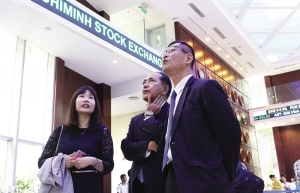Overseas listings require caution amid many pitfalls
How do you view the recent Vinfast listing on the US stock market, as well as the plans of other Vietnamese businesses to list internationally?
 |
| Dr. Ho Quoc Tuan, senior lecturer at the University of Bristol |
Firstly, it’s essential to acknowledge that a Vietnamese company successfully listing on the US stock market is commendable. It signifies our proficiency in navigating international standards and our capability to collaborate with foreign advisory firms on successful listings, or at least in planning such endeavours. We’ve been anticipating this progress for years, and the success of these companies underscores the maturity of Vietnamese businesses and our financial sector.
Given our country’s robust economic growth trajectory, numerous Vietnamese enterprises have grown substantially and possess the resources to afford advisory services, as well as strategically enhance their corporate image to meet listing criteria. This achievement isn’t a sudden stroke of luck; it’s a long-nurtured plan, bolstered by over a decade’s economic development.
However, it’s crucial to comprehend that listing on a foreign exchange is merely one of the tools for capital mobilisation and, to some extent, a means of promoting a corporate image.
Outcomes post-listing, whether firms manage to raise capital, face delisting after a few years, or are compelled to shift to a lower-tier exchange, are common occurrences in foreign stock markets, especially in the likes of the US. This has been the narrative for several Chinese and European companies, and it can certainly be the case for Vietnamese firms. Thus, we should treat this as a minor accomplishment, so if any downturns occur, the disappointment isn’t overwhelming.
What are the benefits and challenges for Vietnamese enterprises listing on foreign stock exchanges?
Two primary advantages of listing on foreign exchanges are the potential to tap into international capital – often at more attractive interest rates compared to Vietnam – and the enhancement of corporate prestige and visibility. This is due to the adherence to international disclosure standards and the subsequent global media exposure.
However, on the flip side, challenges include stricter compliance with rigorous disclosure norms, intensified scrutiny from foreign financial market regulators, and oversight from international analysts. These analysts might not be particularly familiar with the nuances of the Vietnamese economy. Such gaps in understanding could lead to undervaluations of the potential of Vietnamese enterprises.
Additionally, certain domestic practices, deemed acceptable in Vietnam, might be perceived as contravening international environmental, social, and governance (ESG) standards. Companies listed domestically must hence seek consultancy teams with a comprehensive understanding of both Vietnamese and international concerns to help navigate and mitigate these challenges.
Previously, Vietnamese company Cavico was listed on the Nasdaq, but had to exit due to non-compliance with information disclosure commitments. What challenges should Vietnamese businesses anticipate when listing abroad?
Information disclosure is a primary challenge. Currently, compared to Cavico’s time, apart from financial data, firms will need to contend with disclosing sustainability development reports, activities pertaining to Environmental, Social, and Governance (ESG) standards, and engaging in direct interactions with shareholders and analysts.
Such disclosures and interactions are a double-edged sword. While they can foster favourable perceptions, they also risk negative reactions from foreign media and investors. Numerous examples from the US showcase both the good and bad side of this – even well-established conglomerates with decades of experience occasionally fumble during these direct engagements.
How can Vietnamese businesses best navigate the complex landscape of international stock listings?
It’s crucial to understand that listing on a foreign stock exchange, while commendable, isn’t an objective to be pursued at any cost. It isn’t a magic wand and is fraught with its own set of risks.
These risks include failure to meet disclosure criteria, the disparity in the quality of financial reporting domestically versus internationally, and the scrutiny from international media and analysts, who might not be well-acquainted with Vietnamese businesses. This could distract from a company’s primary objectives.
Furthermore, certain individuals might push a company towards international listing for personal gain, like salaries, bonuses, and personal prestige, even when it might not align with the company’s best interests.
Hence, the key is enhancing domestic corporate governance and oversight. Ensuring that only genuinely robust companies venture abroad for listings is paramount. Much like how one would only export top-quality products to maintain reputation, the first line of defence against international failures is stringent domestic quality and safety checks.
Previously, a lack of experienced intermediaries familiar with Vietnamese businesses added to the barriers, though this has lessened over time.
 | Foreign-invested firms eyeing up stock listings Vietnam plans to launch new rules that make it easier for foreign-invested enterprises to list on domestic stock markets, amid necessity to draw in international capital. Nam Phuong reports. |
 | Foreign-led groups prep for listing Some major foreign-invested corporations are making strides towards Vietnam-based listings as part of their global growth strategies, despite the country’s restricted legal access for those entities. |
What the stars mean:
★ Poor ★ ★ Promising ★★★ Good ★★★★ Very good ★★★★★ Exceptional
Related Contents
Latest News
More News
- Banking sector targets double-digit growth (February 23, 2026 | 09:00)
- Private capital funds as cornerstone of IFC plans (February 20, 2026 | 14:38)
- Priorities for building credibility and momentum within Vietnamese IFCs (February 20, 2026 | 14:29)
- How Hong Kong can bridge critical financial centre gaps (February 20, 2026 | 14:22)
- All global experiences useful for Vietnam’s international financial hub (February 20, 2026 | 14:16)
- Raised ties reaffirm strategic trust (February 20, 2026 | 14:06)
- Sustained growth can translate into income gains (February 19, 2026 | 18:55)
- The vision to maintain a stable monetary policy (February 19, 2026 | 08:50)
- Banking sector faces data governance hurdles in AI transition (February 19, 2026 | 08:00)
- AI leading to shift in banking roles (February 18, 2026 | 19:54)

 Tag:
Tag:




















 Mobile Version
Mobile Version